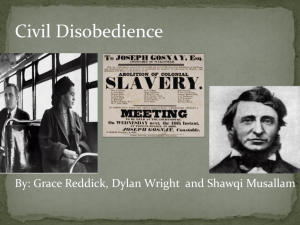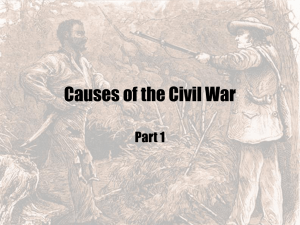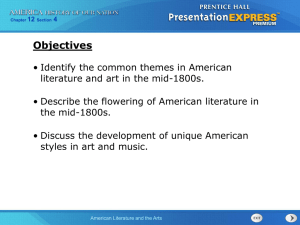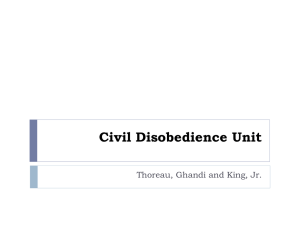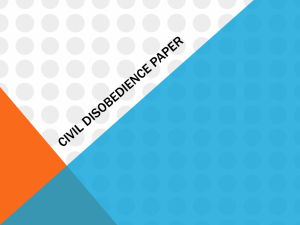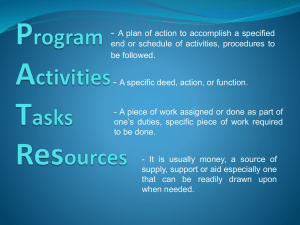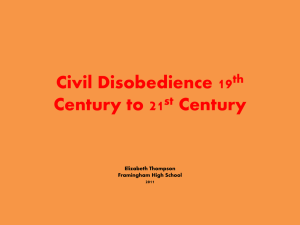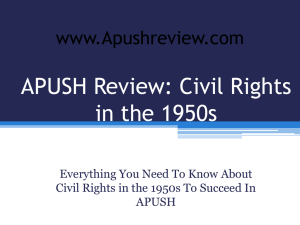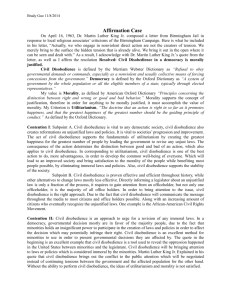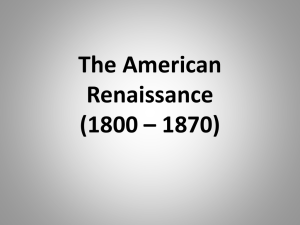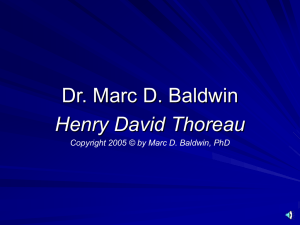Civil disobedience
advertisement
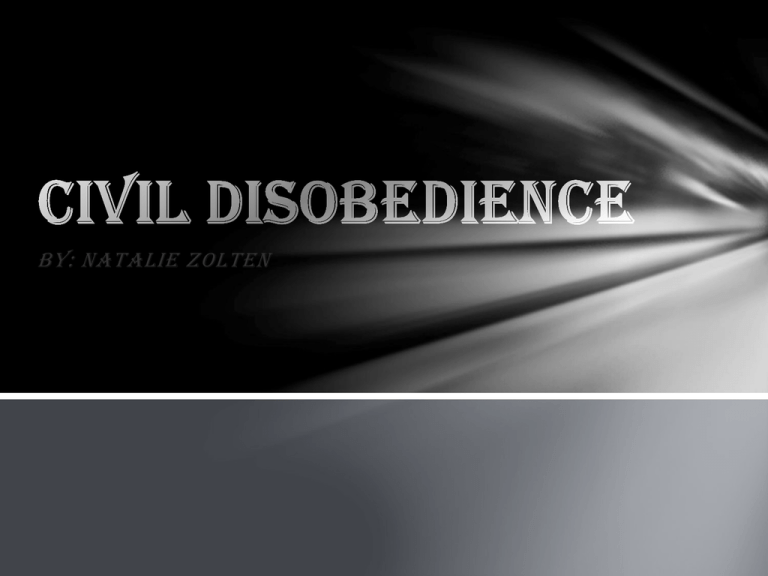
By: Natalie Zolten What IS civil disobedience? Civil disobedience is when people don’t necessarily follow the laws of the government because they don’t believe that the law is moral. They’re doing what’s right by not following a certain law. Examples “If a thousand men were not to pay their tax bills this year, that would not be a violent and bloody measure, as it would be to pay them, and enable the State to commit violence and shed innocent blood. This is, in fact, the definition of a peaceful revolution, if any such is possible.” Civil disobedience is not starting a huge fight, it’s simply standing up and taking action for what one believes is moral. Examples “If the injustice has a spring, or a pulley, or a rope, or a crank, exclusively for itself, then perhaps you may consider whether the remedy will not be worse than the evil; but if it is of such a nature that it requires you to be an agent of injustice to another, then I say, break the law.” Civil disobedience is breaking a law because you don’t believe that it is good. Examples “Unjust laws exist: shall we be content to obey them, or shall we be endeavored to amend them, and obey them until we have succeeded, or shall we transgress them at once?” If a law is bad, or unfair, then civil disobedience would be standing up to fight against that law. Rosa Parks and the Montgomery bus boycott Rosa Parks is one of the most famous figures in the civil rights movement. Rosa parks was sitting on a bus and was told to move by a white person. She refused to move to the “colored section.” Rosa’s refusal led to her removal from the bus and jail time. This is an example of peaceful resistance found in the Civil Disobedience text. Civil rights movement sit ins In the civil rights movement there was a series of sit ins in Greensborough. Feb. 6, 1960 over 500 students from Greensborough University flooded stores and restaurants in downtown Greensborough in protest of segregation. They sat at white only counters and demanded service in stores before whites. Feb. 11, 1960 Students participate in sit-ins across the state. Twenty-six William Penn High School students sit in at the Woolworth lunch counter on South Main Street this was the climax of the sit in movement. Why this is civil disobedience because Sit in were civil disobedience because they were against the Jim crow laws and they were asked to leave the stores and restaurants. This is also an example of peaceful protest that is found in the Civil Disobedience document. Freedom Riders The Freedom Riders were a group of blacks that rode across the country protesting and integrating bus terminals across the nation. The freedom riders were arrested for their protesting. This is an example of civil disobedience because they were breaking Jim crow laws that were being enforced at the time. By: Alex King Underground Railroad The Underground Railroad was a vast network of people who helped runaway slaves escape to the Northern states and sometimes even Canada. There wasn't one leader that controlled it all. It was a success because of the cooperation between all the people that weren't for slavery. Apparently, the South lost 100,000 slaves between 1810-1850 Harriet Tubman A widely known figure that committed civil disobedience is Harriet Tubman. She didn't believe that the way they were treated as slaves was right. Therefore, she took a stand and risked her life to save the people she loved. Viva la Revolution Nat Turner was born in Southampton, Virginia in 1800. Nat viewed slavery the way his mother and grandmother did. With pure, hatred for it. As Nat got older, he developed deep religious beliefs. With his family and religion behind him, he was led to believe that God had chosen him to lead his people out of slavery. This drove him to get a band of slaves and kill white people. It did not turn out well because in the end Nat had been the cause of a hundred innocent slaves being killed. When a militia of 3,000 was sent to find Nat, he went into hiding for six weeks. He was found and killed. Nat had done civil disobedience because he thought God told him to take a stand. He went against the gov't and followed what he believed to be right. This thought of his resulted in his death. David Thoreau Thoreau did civil disobedience by refusing to pay tax.. He thought it wasn't right. He didn't want to contribute to something that didn't sit right with him. Works Cited 1953, October. "Greensboro Sit-Ins: Launch of a Civil Rights Movement : Timeline." Untitled Document. 30 Nov. 2011 <http://www.s itins.com/timeline.shtml>. "The Civil Rights Movement, 1954-1963." 30 Nov. 2011. "Google Images." Google. 30 Nov. 2011 <http://www.google.com/imgres?um=1>. "Google Images." Google. 30 Nov. 2011 <http://www.google.com/imgres?um=1>. "Google Images." Google. 30 Nov. 2011 <http://www.google.com/imgres?um=1>. "Rosa Parks." History Learning Site. 30 Nov. 2011 <http://www.historylearningsite.co.uk/rosa_parks.htm>. "Woolworth's Lunch Counter - Separate Is Not Equal." National Museum of American History. 30 Nov. 2011 <http:// americanhistory.si.edu/brown/history/6legacy/freedom-struggle-2.html>. Wikipedia the Free Encyclopedia. “Henry David Thoreau.” Photograph. Wikipedia. Web. 30 Nov. 2011. American Transcendentalism Web. Jessica Gordon and Ann Woodlief. 1999. Virginia Commonwealth University. 29 Nov. 2011. http://www.vcu.edu/engweb/transcendentalism/authors/thoreau/civil/. Alex King"Nat Turner." Spartacus Educational. Spartacus Educational. Web. 02 Dec. 2011. <http://www.spartacus.schoolnet.co.uk/USASturner.ht m>. "Nat Turner." Wikipedia, the Free Encyclopedia. Web. 02 Dec. 2011. <http://en.wikipedia.org/wiki/Nat_Turner>. "Thoreau - Webtext on "Resistance to Civil Government"" Virginia Commonwealth University. Web. 02 Dec. 2011. <http://www.vcu.edu/engweb/transcendentalism/authors/thoreau/civil/>. "The Underground Railroad." PBS: Public Broadcasting Service. PBS. Web. 02 Dec. 2011. <http://www.pbs.org/wgbh/aia/part4/4p29 44.html>. "Nat Turner." Spartacus Educational. Spartacus Educational. Web. 02 Dec. 2011. <http://www.spartacus.schoolnet.co.uk/USASturner .htm>. "Nat Turner." Wikipedia, the Free Encyclopedia. Web. 02 Dec. 2011. <http://en.wikipedia.org/wiki/Nat_Turner>. "Thoreau - Webtext on "Resistance to Civil Government"" Virginia Commonwealth University. Web. 02 Dec. 2011. <http://www.vcu.edu/engweb/transcendentalism/au thors/thoreau/civil/>. "The Underground Railroad." PBS: Public Broadcasting Service. PBS. Web. 02 Dec. 2011. <http://www.pbs.org/wgbh/aia/part4/4p2944.html> .
